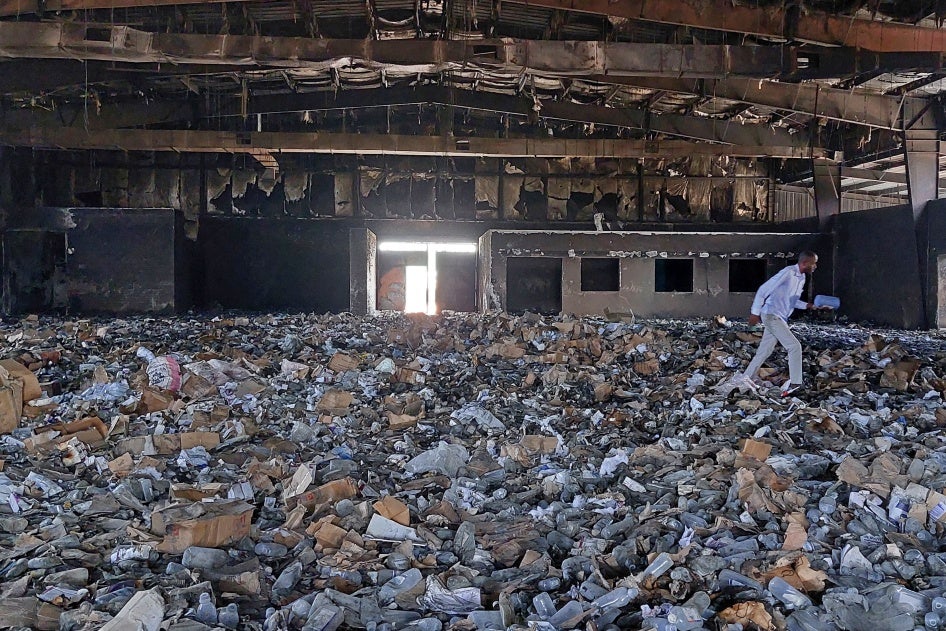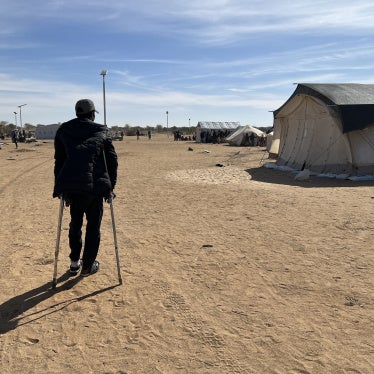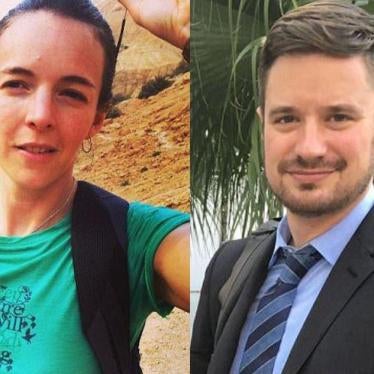(Nairobi) – As global and regional leaders meet in Paris to spotlight Sudan and mark the one-year anniversary of the country’s brutal conflict between Sudanese Armed Forces (SAF) and Rapid Support Forces (RSF), they should make clear that those responsible for ongoing atrocities and other violations of international humanitarian law will be held to account, Human Rights Watch said today. This includes widespread intentional killings of civilians, unlawful attacks on civilian infrastructure, as well as the deliberate looting of aid, which constitute war crimes.
On April 15, France alongside Germany and the European Union are cohosting a conference on Sudan to press for an end to the fighting and for a significant uptick in global funding for the grossly under-resourced response as a hunger and broader humanitarian crisis unravels in the country and in refugee hosting countries.
“The warring parties in Sudan have inflicted tremendous suffering on Sudanese from all walks of life. The global response to Sudan’s brutal conflict needs to change,” said Mohamed Osman, Sudan researcher at Human Rights Watch.“Leaders meeting in Paris should act to tackle the shamefully low levels of humanitarian funding, including for local responders, and commit to concrete measures against those deliberately hampering aid delivery to populations in need.”
The conference comes a year after conflict broke out between the SAF and RSF in Khartoum on April 15, 2023, before spreading to other regions including Darfur and central Sudan. Despite the magnitude of suffering and violations by the warring parties, the situation in Sudan has received an underwhelming response from the international community.
Almost 15,000 people are known to have been killed since then, almost certainly an underestimate. The conflict has uprooted 8.5 million people, most internally, making Sudan the world’s largest internal displacement crisis. Around 1.76 million people have fled into neighboring countries.Without significant humanitarian assistance, five million people could risk starvation in the coming months.
Both warring parties have committed serious violations of international human rights and humanitarian law, amounting in some cases to war crimes and other atrocity crimes, Human Rights Watch said. The SAF have unlawfully killed civilians, carried out airstrikes that have deliberately targeted civilian infrastructure, and repeatedly obstructed humanitarian aid among other violations. The RSF has carried out widespread civilian killings, many of which appear to be ethnically targeted notably in West Darfur, while also hampering aid including by widespread looting of humanitarian supplies. They have used heavy explosive weapons in densely populated areas and engaged in widespread sexual violence and pillage. Both forces and their allies have recruited children and arbitrarily detained civilians.
According to the UN, approximately 25 million people, around half of the population, are now dependent on emergency food supplies, which SAF has deliberately restricted and RSF looted, in clear violation of international law, and in acts that could amount to war crimes, Human Rights Watch said.
Human Rights Watch interviews with aid workers described how authorities affiliated with SAF including its military intelligence have imposed a multitude of arbitrary bureaucratic restrictions that have hampered the work of humanitarian organizations and their ability to reach those in need. These include delays, denials, and nonresponse to requests for visas and travel permits, which the authorities require for aid personnel to move between federal states, as well as the imposition of excessive administrative procedures for importing and transporting relief materials. SAF’s unlawful obstruction of aid follows decades of hostility and routine obstruction towards international relief agencies under Sudan’s former President Omar al-Bashir, adding to the suffering of populations in conflict areas.
Rapid Support Forces and allied militias have repeatedly attacked and looted aid supplies and humanitarian infrastructure notably warehouses, such as the stocks in a World Food Programme (WFP) warehouse in Wad Madani in December 2023. “This attack – in areas controlled by the Rapid Support Forces – affected supplies that could have fed 1.5 million acutely food-insecure people for one whole month,” the United Nations Office for the Coordination of Humanitarian Affairs (OCHA) said. Communities in Darfur have also more recently accused the RSF of looting food supplies destined for displaced persons camps. The Darfur Network for Human Rights (DNHR), a rights monitoring group, said in an April 3 statement that RSF and Arab fighters looted aid supplies including food items for malnourished children from residents of an IDP camp in central Darfur.
Both parties, particularly SAF, have sought to restrict aid going to and through the opposing parties’ areas of control, which has put Khartoum under a de facto blockade since late 2023 and also hampered aid access in Darfur.
A local responder from Bahri city in Khartoum, said: “SAF is preventing any supplies entering the city and RSF is restricting movements within. We are forced to smuggle goods in including food, increasing prices of commodities as a result.”
WFP said on April 3 that it had managed to reach the Karrari locality in Omdurman, which is currently under SAF control, for the first time since December.
On March 6, Sudanese authorities informed the UN that they would only allow cross-border movement through specific crossings under the control of forces allied to the military, adding more financial and logistical challenges for humanitarian organizations.
On March 21, the RSF had released a statement on their official X (formerly known as Twitter) account saying they would not allow aid from Port Sudan to reach El Fashir, the capital of North Darfur, saying this plan will be used for rearmament purposes by SAF and their allies.
Warring parties killed, injured, and detained dozens of aid workers and targeted humanitarian convoys. In December, SAF attacked a convoy from the International Committee of the Red Cross (ICRC), which included civilians to be evacuated, killing two people and injuring seven including three ICRC staff. SAF said following the incident that ICRC had diverted from the agreed route and that they were escorted by RSF vehicles.
Given the blocks on the international aid response, Sudanese responders, many of whom volunteer in the country’s emergency rooms, have borne the brunt of seeking to meet civilians’ growing needs in Khartoum, Darfur, Al Gezira, and elsewhere. Both sides in the conflict have harassed, detained, and otherwise abused local responders. The United Nations High Commissioner for Human Rights said in February said that both SAF and RSF were arbitrarily detaining thousands of civilians and had subjected hundreds to enforced disappearances including members of the emergency response rooms. Human Rights Watch has also documented RSF and SAF arbitrary arrests and mistreatment of emergency responders and healthcare workers in Khartoum.
The warring parties’ blatant disregard for international humanitarian and human rights law has caused the current humanitarian nightmare and left civilians in areas hit particularly hard by the fighting, notably Khartoum and its sister cities and large parts of Darfur, reeling and unable to access basic necessities.
Warring parties’ attacks, including of infrastructure such as healthcare facilities and water treatment plants, have made civilian lives precarious and insecure. Since the conflict’s onset, SAF forces have bombed and both parties have shelled health facilities, while the RSF has repeatedly occupied hospitals. The attacks on healthcare, many deliberate, have left 70-80 percent of healthcare facilities non-functional notably in Khartoum and Darfur. Even those deemed functional face massive challenges, due to lack of electricity, staffing and medical supplies including life-saving medication. “We cannot say there is a functioning health sector,” an international healthcare worker told Human Rights Watch in February. Warring parties’ relentless fighting in residential areas of Greater Khartoum, including using weaponry that frequently results in indiscriminate attacks in violation of the laws of war, over the course of the last year has also prevented the safe movement of civilians and local responders.
In May 2023, both parties committed to uphold international humanitarian law and allow aid delivery during talks hosted in Jeddah by Saudi Arabia and the United States and later joined by the African Union and the Inter-Governmental Authority on Development (IGAD). With reports of a resumption of the Jeddah talks, the hosts should press for the establishment of a mechanism that will monitor implementation of the commitments to uphold international humanitarian and human rights law and protect civilians, including calling out attacks on and deliberate obstruction of humanitarian assistance and unlawful destruction of civilian infrastructure.
UN Security Council and African Union Peace and Security Council member states should maintain scrutiny over the food security situation, by holding regular public briefings over the next six months.
The United States, United Kingdom, and European Union and other countries should coordinate action under their respective sanction regimes on Sudan and urgently designate entities and individuals responsible for aid obstruction and other grave violations.
Governments meeting in Paris should also actively and publicly support efforts to investigate ongoing abuses on the ground, Human Rights Watch said. The office of the prosecutor of the International Criminal Court (ICC) announced in July 2023 that it is investigating recent crimes committed in Darfur as part of his office’s ongoing Darfur investigations. The independent international fact-finding mission on Sudan, established by the UN Human Rights Council in October, and mandated to investigate violations across Sudan, including in Khartoum and Darfur, should be given full support and access, and be renewed as needed until investigations are complete.
“The world should be ashamed by the horrific cost of its inaction. Civilians in Sudan deserve to see a robust, concerted global response,” said Osman. “The Paris conference should not be where the focus on Sudan ends, but rather jumpstart a new approach, announcing major increases in humanitarian funding, including for local responders, and spelling out clear benchmarks and concrete measures states will take to end the weaponization of aid by both warring parties.”
|
News Release
Sudan: One Year of Atrocities Requires New Global Approach
Investigations into Deliberate Aid Obstruction, Possible War Crimes Needed
Your tax deductible gift can help stop human rights violations and save lives around the world.
Region / Country
Topic
Most Viewed
-
November 25, 2019
A Dirty Investment

-
December 19, 2024
Extermination and Acts of Genocide

-
March 31, 2022
Iran: Women Blocked From Entering Stadium

-
December 4, 2020
“They’re Chasing Us Away from Sport”

-
February 19, 2018
“All We Want is Equality”





